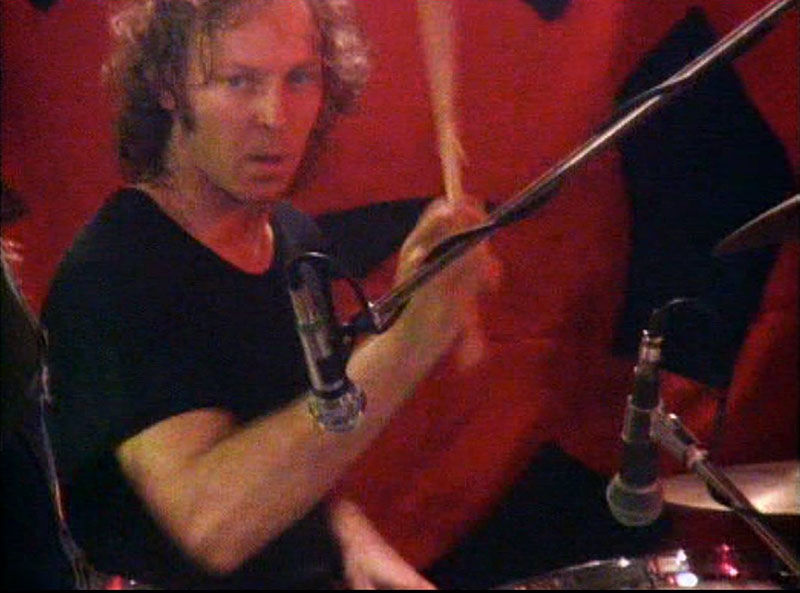
The first thing you hear when the stylus drops on Radio Birdman’s “What Gives?”, “Aloha Steve & Danno”, ”Descent Into The Maelstrom”, “Do The Moving Change” or The Visitors’ “Hell Yes” are the drums.
Solid, to the point, perfectly simple, lots of swing and dead on the money, That drummer’s name is Ron Keeley, who also played with Radio Birdman precursor The Rats (with Warwick Gilbert and Rob Younger), The Other Side (with Rob Younger) , The Hitmen (with Chris Masuak and Warwick Gilbert) and Comrades of War.
I wanted to hear Ron’s story first-hand and have a beer or three with him in his adopted home of Woking, Surrey,l just outside of London. It's only a short, 17,000-mile trip from Sydney, Australia. We met in The Crown, a wonderful old-style “wet pub” (no food, no gambling, no TV - just drink, so what’s not to like?) in July 2023.
Read on at your own peril.
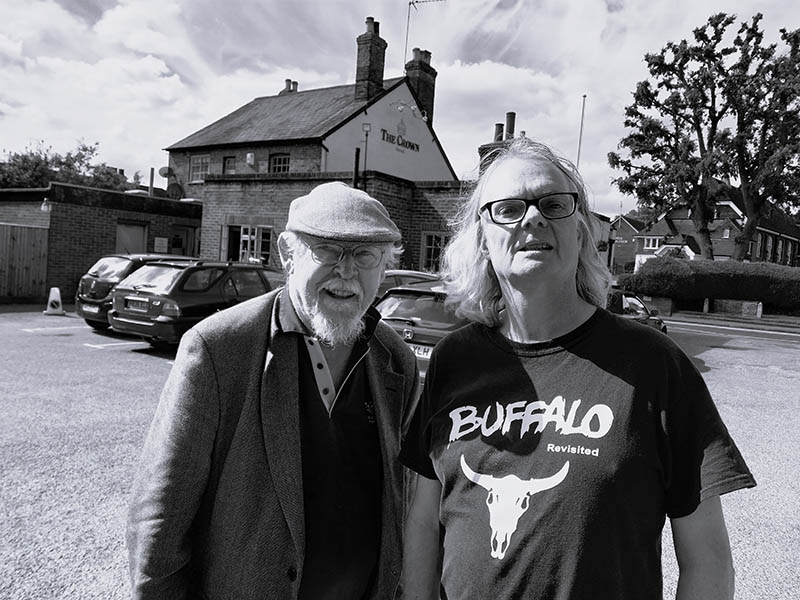 Ron Keeley with his interrogator.
Ron Keeley with his interrogator.
SL: How long has it been since you moved from Australia to England?
RK: I came over here in 1980.
SL: What made you move?
RK: My partner said she wanted to come back to England. she's English, an Essex girl. She said: Do you want to come? I said: Sounds like a plan.
SL You grew up in Western Australia - is that right?
RK: Yeah, that's right
SL So what do you remember about growing up in that era and what were those times like?
RK: Well, in my case it was pretty strange because I was in boarding school so I wasn't really connected with the real world although I did spend a lot of time at Cottesloe Beach. That was pretty good. I went to a boarding school in Gloucester Hill in the Darling Ranges and then after that to Aquinas College, which is one of the five so-called public schools in Perth. It was what it was.
SL: So, what was the musician or the song that got into your head to make you realise that music was something you were going to grow into? Anything you saw on TV or a concert
RK TV?
SL Or on the radio?
RK: I was in a borrowed car driving down Shirley Highway to Fremantle and “Little Red Rooster” was coming on the radio and I was like, 'Whoa, that's the dark side'. Before that, there was The Beatles which was like jumping into an ice bath.
SL: For a lot of people (during the 1960s) “Little Red Rooster” was the song that was from outer space or from another planet. So, what was the music that you heard that made you want to think you could be a musician yourself?
RK: I don't think there was anything in particular that I could point out, I listened to a lot of jazz back in those days after I joined the Navy.
SL What sort of jazz?
RK: Mostly big bands, Count Basie, Duke Ellington, Ronald Hampton, but I also was a big fan of Chuck Berry. It was in the Navy that I started playing drums, the side drum, I used to play along to Chuck Berry and Them... “Baby Please Don't Go” ... “Gloria” ...
SL: So, it's been said that your drumming in the military helped shape the style that you would develop later on. Do you think that's correct? Military drumming is very solid and precise.
RK: My drumming with Birdman and The Visitors was more or less conditioned by the numbers themselves, there wasn't scope for any tricky stuff; the most technical I ever got really was a paradiddle which was the basis for a drum roll. (demonstrates) There are all sorts of paradiddles.
I couldn't try playing anything fancy through “TV Eye” or “Hand of Law” because, in the Oxford Funhouse days and some time beyond, I was un-amplified. Deniz would have a 100-watt Marshall stack, Chris with the same. Pip had a 100-watt Fender Twin Reverb and Warwick was behind me with a 300-watt bass rig. I used to come off the stage some nights with sore kidneys from being punched by a wired explosive device.And in that sort of environment, you can't do fancy stuff. It just gets lost.
I used to reverse the sticks just to play louder, and it's actually quite hard to play with them because you haven't got so much to grip, They used to fly off.
SL: So you had a few bands before The Rats, I thought I read somewhere?
RK: Not really. I was in a band in Perth before I joined the Navy, I think it may have been called Peter & The Drifters. I was the keyboard player.
SL: You were?
RK: Yeah, well I had piano lessons until the age of seven and in fact I found out just a while back that I got to the same level as Pip at Trinity College, Grade 7. He's a much better keyboard player than I ever was but it wasn't any big deal in Perth in those days, we’d turn up to a church hall or somewhere to play a gig and (there was) no piano or if there was, it hadn't been tuned for 40 years...so that wasn't a big success.
I've got a book somebody sent me about West Australian rock and roll bands in the ‘50s and ‘60s and it mentions Peter & the Drifters and I think I recognised one of the names, I think his name was Jim and he was the drummer and I was very much pestering him to let me have a go.
SL: So what year would that have been?
RK: '62 or maybe early '63. I joined the Navy in July of 1963.
SL: So how were The Rats to play with and had you previously heard the music that that band played like New York Dolls and Stooges songs?
RK: A lot although by that time. I had met Deniz Tek and he did introduce me to those songs by the Stooges, MC5, Alice Cooper, Ted Nugent. He was a big Ted Nugent fan.
You know Deniz's trademark running triplets? That's Ted Nugent; straight lifts from Ted Nugent.
SL The song lists I've seen of The Rats are just Stooges and Dolls. There might have been an MC5 song, maybe?
RK: “Sister Anne”. “Ramblin' Rose”.
SL Were the musicians in that band just wanting to get started and getting used to being in a band by playing the only music they knew?
RK: Yeah, pretty much it.
SL: Was it Rob's creation, that group?
RK: Pretty much, yeah.
SL: So what was the audience reaction? If there was an audience for The Rats? I know they played the Oxford a few times.
RK: I think we did, yes. I can't remember whether some of this is Birdman or The Rats but there was a gig…I think it was in Waverley at some sort of girls’ college…there wasn't much of a stage, it was probably six-inches high. And at some point, this guy came up on stage...Rob probably had his back turned to the crowd and was facing us, he dropped his shoulder into him, turned and (the guy) hustled away, and as he did, I flicked a stick after him and got him - bang! - on the back of the head.
SL: So the Rats played a few shows at the Oxford, Was that like a biker bar then? It was a pretty dangerous part of town.
RK: I don't think so.
SL: So the Rats did mainly Stooges, New York Dolls, MC5, “Strutter” by KISS?
RK: Really? KISS? ...I'm amazed. Everything I know about Rob tells me that he would hate doing a KISS number.
SL They're sort of Dolls-y. I mean early KISS were... they took a lot of their stuff from the Dolls.
RK: I might have heard one or two tracks but that's all. Never grabbed me.
SL: So there's no originals in The Rats or '60s songs?
RK: No originals. No ‘60s…maybe 13th Floor Elevators.
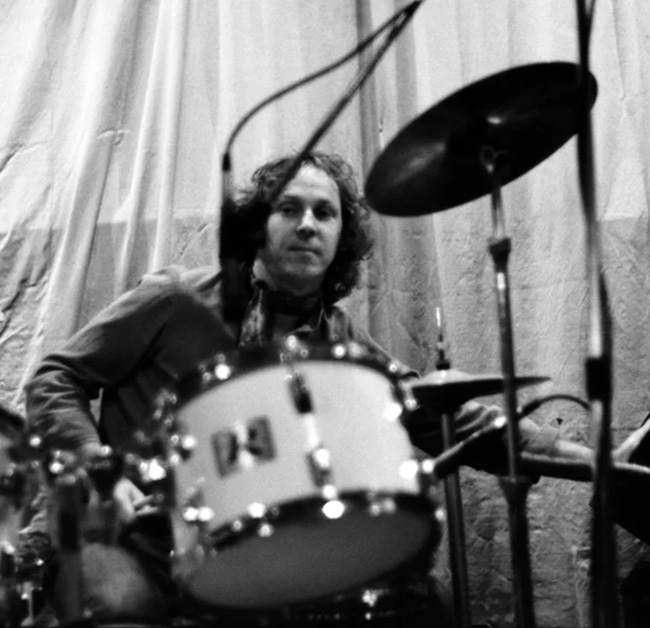 Bruce Tindale photo.
Bruce Tindale photo.
SL So I believe Warwick wanted to do music that was more like the Yardbirds and that might have caused him to leave The Rats. Did that cause the break-up of The Rats?
RK: That rings something of a bell, a distant chime.
SL: What were your thoughts when Radio Birdman started rehearsing and doing original songs as opposed to covers? how was the feeling on your side of things when that started to happen?
RK: I felt great, the thing about Deniz's songs is that they're really good fun, and I've told him this that playing Deniz's songs gave me a sensation of like fierce joy. There were some numbers particularly where I felt like Bruce Lee, you know, wham. bam, pow, whack, whee-yoo! yeah, because it was a whole other level to The Rats, really exhilarating to play.
SL: And it was just so adventurous for the times, like everyone else back then was probably doing blues or boogie, It was pretty brave of that band.
RK: The Angels, AC/DC were contemporaries.
SL: So, could you sense anything special during the early Birdman rehearsals? A lot of the songs Deniz brought from TV Jones like “Monday Morning Gunk”, “I-94”, “Man With Golden Helmet”?
RK: “Skip the Pimp”, although we didn't do that in Birdman. That was a Visitors song.
SL: And Feather (John Swan, Stuart Frasier pre- Noiseworks and Chris Jones pre-TV Jones) did “Skimp the Pimp”, I’ve got a tape of them doing it.
RK: Chris Jones co-wrote that. Do you know where the band name came from?
SL The initials of the band members?
RK: Apparently there's some guitar maker called TV Jones but that's not it. In black American slang in the '60s, a jones was a habit, specifically a heroin habit, so by extension, any habit is a jones. TV Jones is a TV habit.
SL: I didn't know that, I thought it was T for Tek, V for Vanderwerf (bass player) and J for Chris Jones (guitar). I first heard of Radio Birdman in RAM magazine when Anthony O'Grady started mentioning them, did his writing help boost the profile of the group?
RK: Very much, very much... definitely. We won the Battle of the Bands on his vote and that kicked it off for us.
SL: What do you remember about that show? Was it Just a short set?
RK: It was a short set and it was the same drum kit for everybody. It wasn't my kit, the set up was a bit different. I think I only had one tom-tom, whereas normally I'd have two.
SL: You were supposed to get some Levi's jeans as a prize but that never happened?
RK: No. We got the recording deal.
SL With Trafalgar?
RK: It wasn't Trafalgar initially; it was another studio. It was on the city side of Pyrmont Bridge, So many studios back then like Earth Media. My mate Bob Dixon worked there, he was the commercial business manager and that's how I came to organise a Rats session and TV Jones before that.
I was briefly - very briefly - TV Jones' manager. it wasn't a great success; I didn't have a clue what I was doing.
SL: It would have been hard getting them shows
RK: There was a gig, we did it at one of the halls of residence at the Uni of New South Wales but that may have been something that Deniz organised because he was living there before he moved into Havishford Street, I remember telling him that he could either play guitar or sing but he shouldn't do both. It just goes to show how wrong you can be really doesn't it
SL: How was he in TV Jones being the singer and guitarist?
RK: Um, just being Deniz and just doing what comes naturally.
SL: So, the first gig Radio Birdman did was at the Excelsior Hotel. Any memories of that? I believe the entire audience was John Needham, Doug Lonsdale, Alley Brereton and maybe a few girlfriends. Any memories of that first gig?
RK: I remember stacking up two pool tables one on top of the other to make some room and I remember (original bass player) Carl Rourke had a rotating yellow light which he wanted to stick behind the kick drum.
SL: Famously, Radio Birdman's first show at the Oxford was after Deniz Tek met Lou Reed at a press conference.
RK: That's what I'm told, yeah.
SL He invited Lou to a gig which didn't exist and Deniz lined up a gig that day in the hope that Lou Reed would turn up, is that right?
RK: I don't know. My recollection is that we got the Funhouse as a venue and that was my initiative. I can even tell you that I cut the deal with the guy who ran the bar whose name was Theo, he was one of the offshoots of the Greek community around there. My recollection is that I organised the Funhouse so we had somewhere to play. Because we played two gigs at a place called the Heffron Hall, it’s down the hill from Oxford Street, because I was Mr Darlinghurst.
While still in the Navy I lived in the Cross then I lived in Arthur Street, Surry Hills, then Paddington, Crown Street just off William Street, then 99 Boundary Street....a very important place. I think 16 Taylor Street, just around the back of Taylor Square, then Sims Street, Rose Terrace and then I'm not sure. I knew every crack in the pavement around Darlinghurst.
SL: The Oxford had been a venue for a long while, wasn’t it? Bands played there in the '60s.
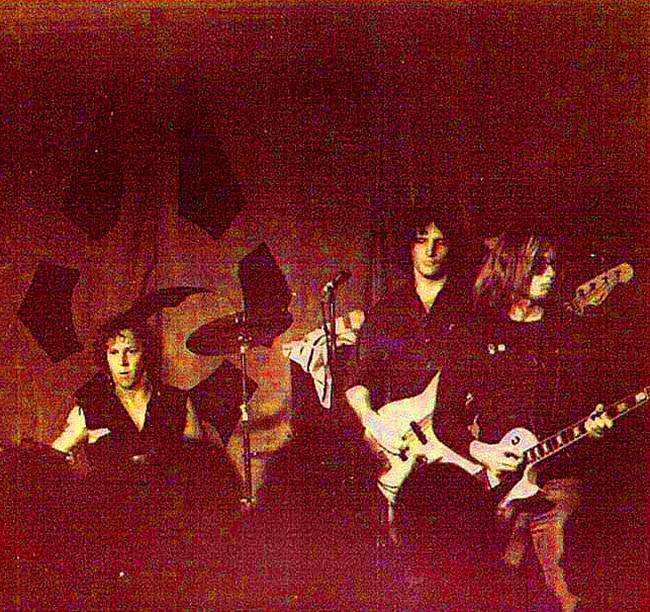 Ron with Warwick Gilbert and Chris Masuak.
Ron with Warwick Gilbert and Chris Masuak.
RK: There (also) used to be gigs at the Greek Orthodox Church (on Oxford Street) and I use to do light shows for bands like Tully and Taman Shud, I remember going backstage at one of their gigs and I carved slivers of hash off of a block the size of a house brick.
SL: Oh shit!
RK: Definitely, oh shit.
SL: So, what did you think when Pip left the group and Chris joined which would have changed the sound dramatically having no keyboards and two guitars?
RK: I was happy to have two guitars because Pip never played rhythm and having Chris churning out solid chunky chords was great for me, it was like the Stones with Keith Richards and Mick Taylor, it was that sort of combination. Deniz is a guitar hero.
SL: I heard Warwick didn't like it when Pip left and it was two guitars, it just became more generic or more traditional.
RK: I suppose it was in a way.
SL: When Birdman did some suburban shows like The Hurstville Civic Centre and Manly Vale, any memories of how the band was received way up in the suburbs as opposed to the inner-city Oxford Funhouse?
RK: I think we did all right in Manly Vale.
SL: Birdman played with Cold Chisel; they were the opening band, weren't they?
RK: Ooh, not that I remember. I remember the opening band at one gig, I think it might have been Manly Vale and it was the Ferris Brothers?
SL That was an early INXS, and you played with Ted Mulry Gang?
RK: That was in Melbourne I think and that was a very hostile audience, basically they'd come for Ted Mulry. That was a gig where I kept the sticks (drumsticks) tucked in my back pocket for on the way out. I fear no man with a pair of sixes in my back pocket.
SL: So it seemed like to an outsider that there were tensions within the band between some people. Was that actually the case?
RK: That was very much the case, Rob and I rarely got along, I think Rob and Warwick didn't get along a whole lot. I can't really speak for the others, I got on with Warwick of course and Chris. Pip pretty much kept himself to himself.
SL Was that causing you grief? because even though you may not have got on with Rob, you played in three different bands with him
RK: Yeah, well, The Other Side was with Rob primarily. And it did kind of amaze me when he asked me to join, but that was probably, late '79 early '80. And at that point I was probably committed to coming here to England. So my stint with The Other Side was always going to be short term.
SL: How was going to Europe in 1978? It would have been tough for the band traveling together, living together which you probably hadn't done before.
RK: We used to hang around a lot but not like 24-7 and it was not something I think we ever thought about or would have been prepared for; we threw ourselves into it as we did with most things and yeah there were definite tensions.
SL: Were you going to stay in the band because I think Warwick had already decided he was going to resign but he thought he'll do the album; he'll do the tour.
RK: I think I have a vague recollection of that. I was firmly in the band at that point. It wasn't until Rockfield (Studios) that I’d had enough playing.
SL How was it when Deniz was producing? It seems like he was just focused on recording.
RK: Well, as far as I knew, I was cut out completely.
SL:You just played the drums and that was your job?
RK: Yeah, I was shut out of the mix, I didn't have anything to do with the production. Rob and Deniz seemed to be running that at the same time and that pissed me off.
SL: So what did you think of those songs on “Living Eyes”? obviously it was more of a progression for Deniz's songs, some like “Hangin' On” and “More Fun” which was definitely a step up. Any favourites from that album?
RK: I like “Hangin' On”, I just love that long feedback note, I mean that to me is just genius, from my point of view I had very little to do, it wasn't a number to play around with, I just nailed the beat, keep it steady and let Deniz do his thing. (ED: It was Chris Masuak).
SL: I think I'm the only person who liked Birdman's version of “Didn't Tell The Man” (which is on "Living Eyes” the Redeye CD edition and on the Citadel box set) which is a real Stones-y thing. What did you think of that version?
RK: Yeah, yeah, it was alright, you know. It didn't move me one way or the other particularly, You just you do what the number calls for
SL I like Rob's singing on that...but myth has it that he deliberately sang it badly because he didn't like the song...
RK: (Laughs)
SL: But it sounds great. He sounds like Mick Jagger on “Exile on Main Street”.
RK: He's never liked Chris Masuak's songs which was a great cause for grief.
SL:”Death by the Gun” was a great one and “TPBR Combo”.
RK: Do you know what TPBR Combo is?
SL Tuna, peanut butter, rye (sandwich)?
RK: (Laughs) Yeah.
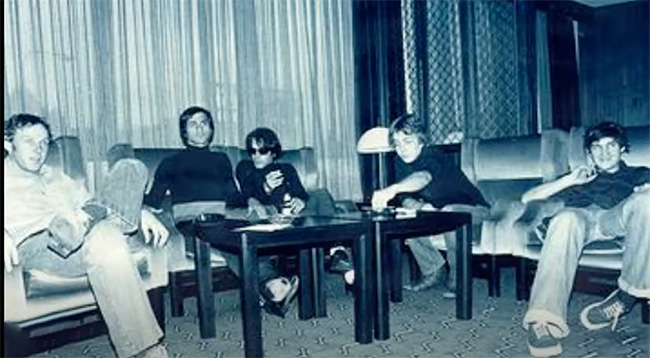 Ron Keeley, Mark Sisto, Deniz Tek, Steve Harris and Pip Hoyle as The Visitors in 1980.
Ron Keeley, Mark Sisto, Deniz Tek, Steve Harris and Pip Hoyle as The Visitors in 1980.
SL Do you remember how The Visitors came together?
RK: Yep. I do remember, Birdman played the last gig - not at not Oxford University as everybody says but at what was, in those days, Oxford Polytechnic which has since become Oxford Brookes College of Oxford University. But back then in 1978, it was Oxford Poly which in Australian terms is a TAFE. I remember it as a cracking gig because by that time we'd been playing almost every night for weeks. So we were really, really tight. And then everybody went their way.
SL: There was no discussion?
RK: No, no group hugs, no back slaps, no high fives. Everybody just went their way.
Chrissie (Ron’s partner) and I stayed on for six months. We eventually flew back (to Australia) and somehow or other (I don't know how) I received a message from Deniz wanting to meet and we met at the Clock Hotel in Surry Hills. On Crown Street. And he said he's forming a band and I want you to be the drummer.
SL: Did you think Birdman was still continuing at that point?
RK: No, we sort of just knew and by that point I wanted nothing more to do with Rob, but for Deniz, I'd jump through fires... straight in. Because at that point Deniz and Pip were in their intern year as medical students at a hospital in Newcastle, it did make things slightly complicated.
So they'd come down one weekend and we'd rehearse, the next weekend we'd hopefully have a gig and then rehearse, gig, rehearse, gig. This is a very short-term band.
SL: I saw them at the Civic Hotel and that was incredible,
RK: The interesting point is, and John Needham's made this point, that if Birdman hadn't broken up, those Visitors songs would have been the next Birdman songs. Personally I think Sisto did a much better job than Rob.
SL:I heard at one point Rob was going to be the singer in The Visitors.
RK: Was he? That never got through to me, I probably would not have joined, maybe I would have.
SL: So what did you think of those Visitors songs as opposed to the Birdman songs?
RK: “Hell Yes”, I loved.
SL Oh yeah, that EP is fantastic.
RK: I remember one gig at the Civic, Sisto wanted to bring us some empty 44-gallon drums. Boom boom boom!
SL: He was a very theatrical frontman, wasn't he?
RK: Oh yeah, great voice too, really great voice, a real Jim Morrison voice.
SL: Yeah exactly. Then towards the end of The Visitors there was the Comrades of War show (a near Radio Birdman reunion just prior to Deniz moving back to the USA). What were your feelings on that because Rob was going to do that originally, wasn't he?
RK: No, my recollection - and somebody famous said recently recollections may vary - was that he was never in.
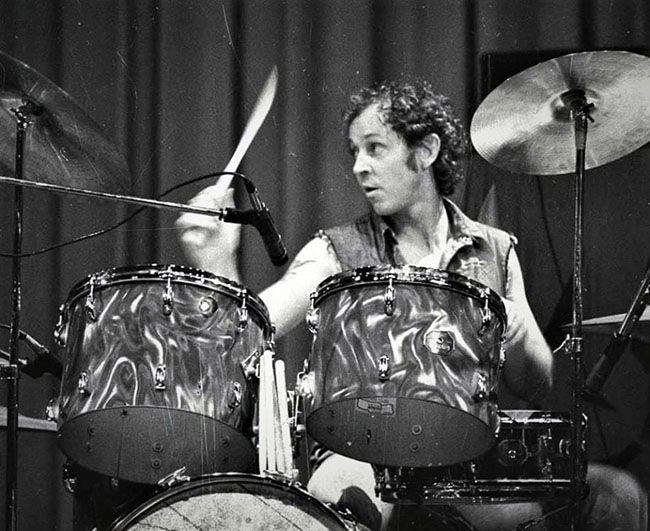
SL: Going back to the Visitors how was Steve Harris to play with as a bass player? Because I think he's astounding and he’d never played bass before the Visitors either.
RK: No, he was a keyboard player.
SL: Warwick's got that rumbling very solid thing but Harris was just all over the place.
RK: Harris was possibly more melodic but Warwick was really percussive. Warwick used to come off stage his forearms would be cramped up from playing as fast as we did but Steve had a really great sense of harmony and that suited numbers like “Brother John”, “Hell Yes”, “Journey by Sledge” and “Sad TV”.
Yeah, he was a great to play with. The relationship between the bass player and the drummer i's fairly crucial in any band.
SL: So you've played with some great bass players, I just wanted to ask you about your thoughts of playing with those particular people. Firstly, Warwick Gilbert ?
RK: Great. I didn't have to worry about him. I’d do my thing and he’d do his thing, somehow or other we meshed.
SL: Clyde Bramley is one of my favourite bass players and was in The Other Side.
RK: Yeah. I don't have any strong memories of Clyde one way or another, really.
SL He was in the (Hoodoo) Gurus. He really made a lot of those songs.
RK: I think if we'd have stayed in Australia, I could well have wound up with the Gurus.
SL Wow, yeah?
RK: I think I did rehearse with them one time.
SL Before James Baker? He might not have been in Sydney then.
RK: And I think James Baker was one of the names I recognised when I was saying earlier about the Perth band The Drifters, I think he was in The Drifters.
I'm good friends these days with Tony Thewlis (Scientists). He lives in London, somehow, I came across an interview with him. It might have been on the I-94 Bar,
He mentioned living in London and I thought, well, this is a real coincidence because he's from a West Australian wheatbelt town called Coolum. I'm from a West Australian wheatbelt town called Corrigin, which is about 50km away. In WA terms that’s like next door, in fact, we used to play the rival football team.
The connection with Tony is even weirder because it turns out that he knew my sister and her first husband, a guy called Ronnie Pope and Ronnie gave him a fuzz box.
Tony says he still uses it. Tony played his first gig with Ronnie and Chris - my sister's also Chris. They all live in the same little neighbourhood.
SL: And what were your thoughts on the “Descent Into The Maelstrom” documentary?
RK Yeah. Yeah, oh great. Yeah. Great job. It was great to have the story told by everyone. (Producer) Jonathan Sequeira's genius was just to let everyone condemn themselves out of their own mouths. I organised a showing down here (Woking) and at the end everybody threw beer mats at the screen at Pip.
SL When you moved to England you played in a few bands here?
RK: Yeah, I played in a few. Not until after 1996.
I sold my kit in Australia. My lovely white Rogers kit was sold to Ivor Hay (The Saints). So I didn't have a kit, but when we came back from that Big Day Out tour, I bought a kit and found another band, First of all we were The Suspects and then the Crown Joules.
SL What sort of stuff were you doing?
RK: Pub rock, you know. Free, ZZ Top, Deep Purple, AC/DC...standard English pub rock
SL: That would have been fun, they all had great drummers, those bands like Free.
RK Oh yeah, it was good fun and the name Crown Joules was because we used to meet here (The Crown Hotel) talking about what numbers we were going to do, so that was the Crown.... and Joules, as in energy joules
SL: Did you read Chris Masuak's book and what did you think of that?
RK: Oh, don't ask me that.
SL Don't ask?
RK: No.
SL Do you get on with Chris?
RK: Yeah...haven't seen him for ages.
SL: He came to Sydney recently and did some shows.
RK: In a way, I'd love to meet him because he lives in Spain, so it's an hour across the Channel.
S: So do you have any bad memories from the Radio Birdman days, can you listen to their music today?
RK: I just listen to them and enjoy them. I just say, ‘Fuck we were good’.
SL:Yeah, absolutely.
RK: I emailed Deniz last year said exactly that: 'Fuck, we were good'. and he’s replied 'Well on a good day we're probably as good as anybody in the world’. ,But of course, you don't always have good days. Which is something Rob never ever understood. I assume Deniz understood. When we had a bad gig, the doom and gloom in the changing room afterwards was pretty oppressive, and I used to say: 'Look, even the West Coast Eagles don't win every game'.
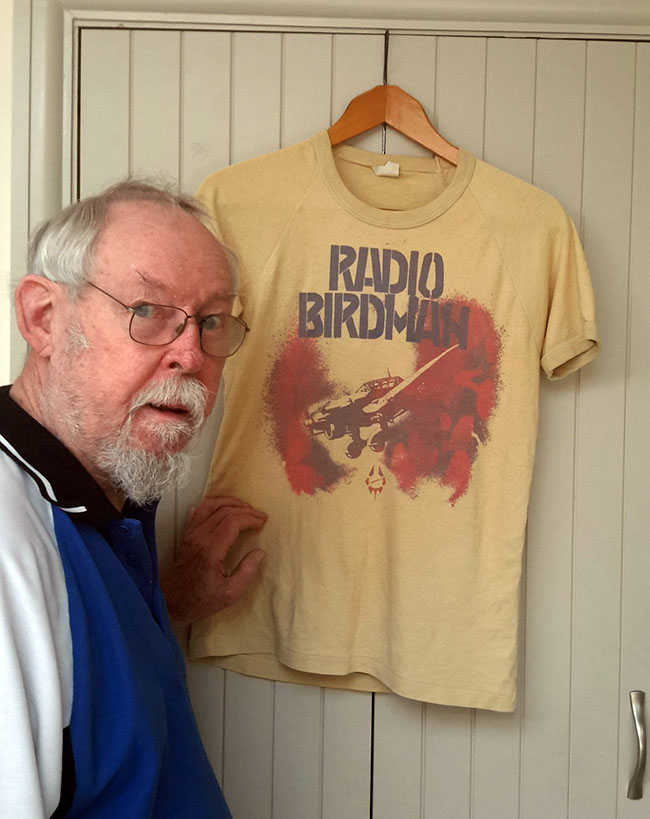
SL:Yeah, that's part of the magic, it's not like a straight line forever. It's up and down. That's the magic of being in a band.
RK: And you've got to take it as it comes,
SL: So what were your favourite songs to play in Radio Birdman and The Visitors? From a drummer's perspective.
RK: No question about it. “Hand of Law” and The Visitors: “Brother John”.
SL Did you get to hear the “Zeno Beach” album that the band did in 2006? Thoughts on that one?
RK: Sad.
SL It's not the Birdman from the 1970s, it was a new thing, but I thought those songs really grew each time you hear them.
RK: Not new enough. I was on the demo sessions.
SL What songs did they demo? I know there was a Tek song, “What It's For”.
RK: I think that was recorded at a studio in Melbourne. I can't remember which tracks now but as we rehearsed them, I thought this was an opportunity for Birdman to take off in a slightly new direction. There was one number...I can't remember what it was, but I can definitely hear a blues harp, it was a bluesy number, it was nostalgic.
SL Was that Photo Album which was on a B side?
RK: Yeah. It was kind of a blues number which of course is anathema to Rob, A lot of numbers that we rehearsed were…I can hear a sax on one of them, it was just an opportunity to go in a different direction and Rob wouldn't have it.
SL: So you played on the seven-inch of “Buried and Dead” and “ Ballad of Dwight Fry”. What did you think of that single?
RK: Not a lot. Just going back to "Zeno Beach", I think it just turned into a sub-Birdman crunch, Rob's idea of subtlety is a sledgehammer , Yeah, anyway, “Zeno Beach”, I think I was disappointing. .
You look at bands like Aerosmith, Blue Oyster Cult, who I rate really highly, they made the transition from being sort of foot-to-the floor, straight-out rock and roll bands to something a bit more subtle…dare I say mainstream…but shit they made some money. (Laughs)
SL Yeah, Aerosmith had some big pop singles, power ballads.
RK: (BOC had) "Don't Fear The Reaper", you know, because they had one hit like that...
SL I don't think Birdman could have ever done power ballads or got onto the AM radio
Alice Cooper's a good example - he can move with the times; you get on the radio. still do big shows.
RK: Well you know given Rob's attitude to things that was never a starter.
SL: But it could be a good thing or be a bad thing depends which way you look at it
RK: Well, yeah, it's kind of dusted and we're all in our 70's. was it a missed opportunity? Possibly.
SL:I think Birdman were a bit too special to be a stadium rock band like KISS or something.
RK: None of the numbers were really suitable for stadium rock. I mean for stadium rock you've got to be able to extend the playing.
SL Yeah, but the great bands are like that you know, MC5, Stooges.
RK: Yeah, yeah, yeah. Live fast, die young.

